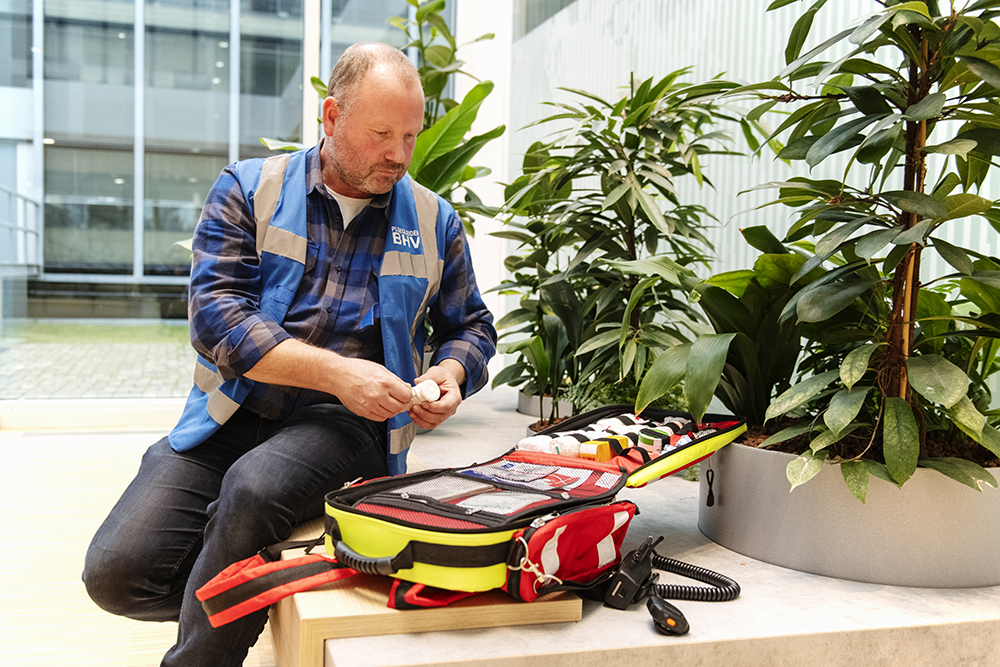
‘In an emergency, I know exactly what to do’
For over 25 years, Christiaan Pen has been a valuable member of the faculty, both as an instrument maker and emergency responder. What is it like to support your colleagues during crises? Five questions for Christiaan.
Why did you become an emergency responder?
‘Alongside my work as an instrument maker, I’ve been an emergency responder for over 25 years now. I first learned the basics of providing aid as a Sea Scout and discovered how valuable it is to know what to do in an emergency. The Fine Mechanical Department, where I work, is also service-oriented, and helping others comes naturally to me. It’s now second nature: as soon as my pager goes off, I’m ready to act.
My responsibilities as an emergency responder are varied. I provide first aid, work with breathing protection equipment, handle minor firefighting tasks, and act as a team leader. In that last role, I coordinate a team of emergency responders when an alert comes through.’
What happens when an alert comes in?
‘When my pager goes off, I stop with whatever I’m doing immediately. All the emergency responders who are called gather at the assembly point at the end of the E-wing, near the Fine Mechanical Department. Being one of the first to arrive, I usually take on the role of team leader.
As team leader, I oversee the situation, direct the emergency responders, and communicate with those involved. Alerts often contain little detail, so I contact the reception desk, which receives the alert and usually has more information. Based on that, we assess what’s needed.
For a relatively minor incident, like a small cut, not all 65 emergency responders are required to take action. Still, they are all called and remain on standby until we understand the situation and determine the required assistance.’

What’s one of the most memorable incidents you’ve experienced?
‘In December, there was a chemical spill. It was quite unusual. What exactly had happened, and how serious was it? It was both exciting and insighful to witness how such an incident unfolds and to realise how crucial our role is—not just in helping the affected colleague, but also in ensuring the safety of others in the building, including students. Fortunately, the impact was limited.
This is a unique place to be an emergency officer, as so many different things happen here. We often encounter situations involving individuals experiencing distress, such as students with autism or panic attacks. These incidents require strong social and communication skills, as physical assistance is not always immediately needed or possible. In such cases, calming and supporting the person is often the best you can do.’
‘This is a unique place to be an emergency officer, as so many different things happen here.’
How do you keep your skills as an emergency responder up-to-date?
‘We undergo extensive training four times a year to maintain our first aid skills. Additionally, we have extra training sessions, such as for using breathing protection equipment. In total, there are about six training sessions annually, ensuring we remain sharp and well-prepared.
Practical experience also plays a role. Last year, my pager went off ninety times, including around forty actual incidents. These ranged from minor injuries to chemical spills and fire alarms. Even test alerts help us stay ready to respond immediately.’
Do you have any tips for colleagues who are not emergency responders?
‘Put the internal emergency number in your phone. For our faculty it is 4444 via the landline. If you call from your mobile phone, use 071-5274444. Through this number you reach reception, which then alerts the emergency responders. Make sure you clearly state which building and location you are in. This helps us locate you quickly. The emergency responders are always faster on site than external emergency services and can act immediately. Of course, you can still call 112 yourself afterwards, if necessary, in which case the other emergency responders can receive the emergency services outside and direct them to the incident.’

Want to become an emergency responder?
Interested in joining our emergency response team? You’re more than welcome to join the team.
Be aware that to keep your emergency response diploma, you will need to take part in at least six internal exercises per year. This will take a maximum of 12 hours annually. The exercises are spread throughout the year and you will receive a list well in advance so you can schedule them at a time that suits you. You are also expected to regularly work on campus. The university needs more emergency responders on Wednesdays and Fridays in particular. You will receive an annual gross allowance for your work as an emergency responder.
Feeling inspired, or would you like to learn more? Contact the emergency responce coordinator for our faculty, or visit the staff website for more details about emergency response.
